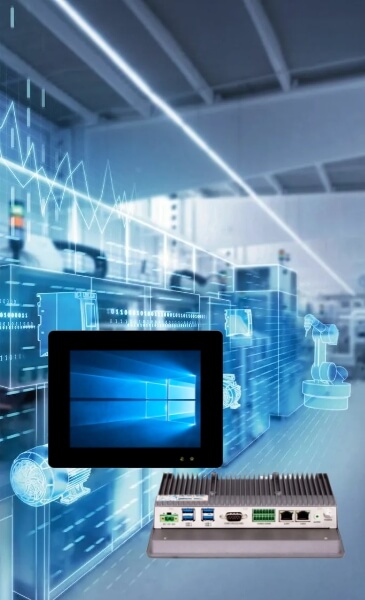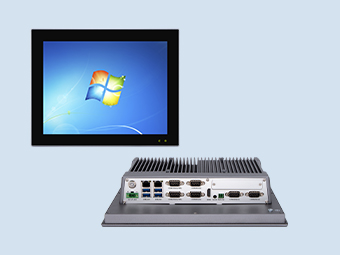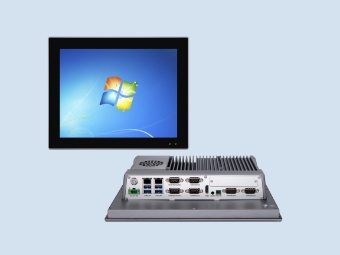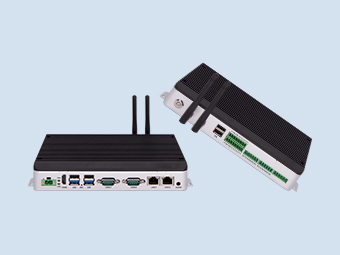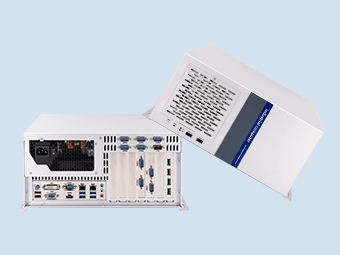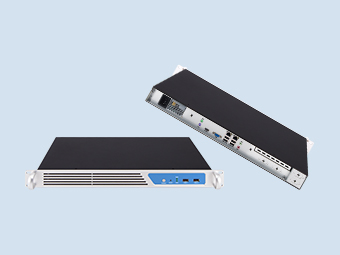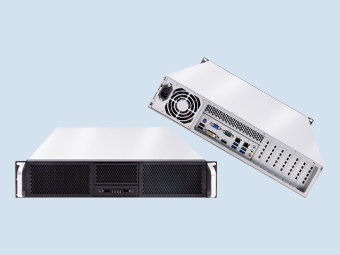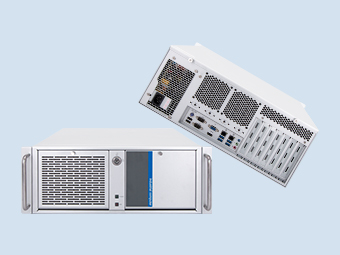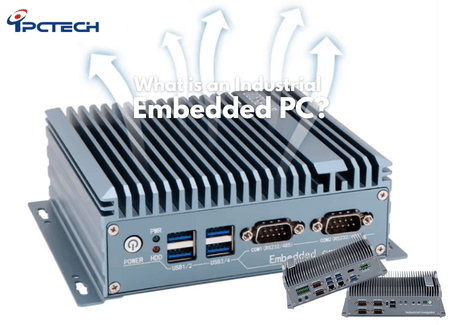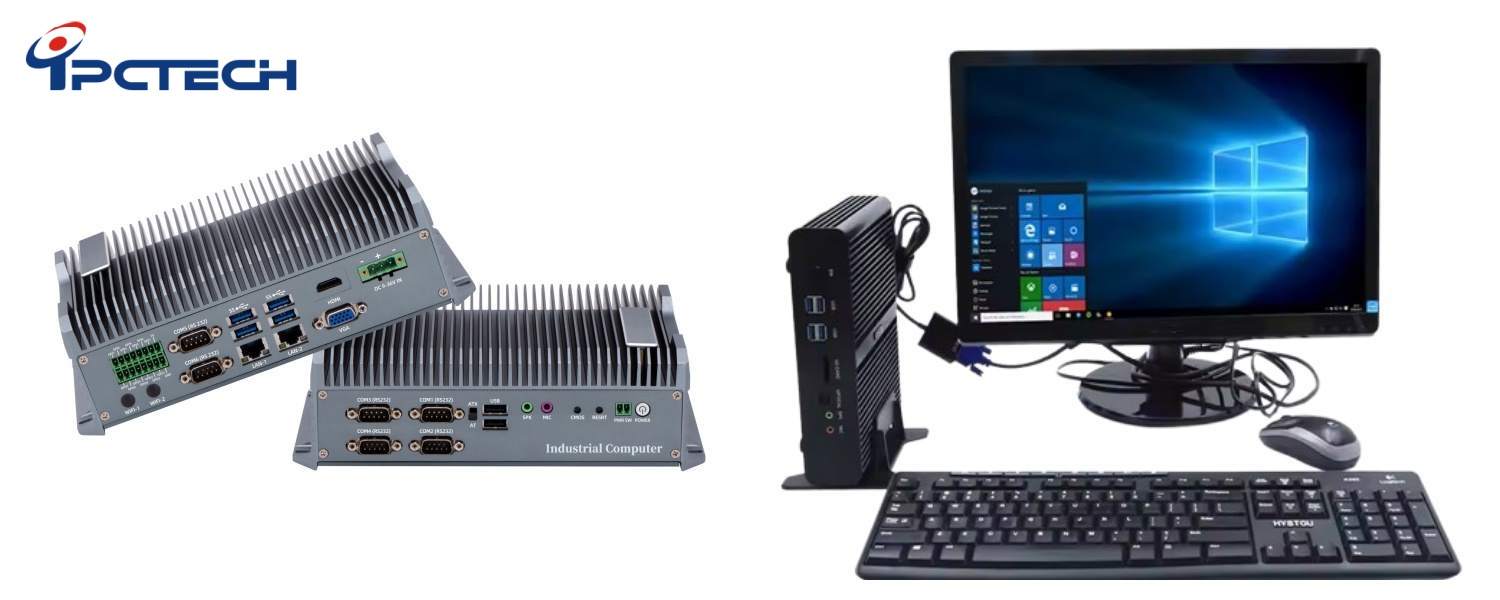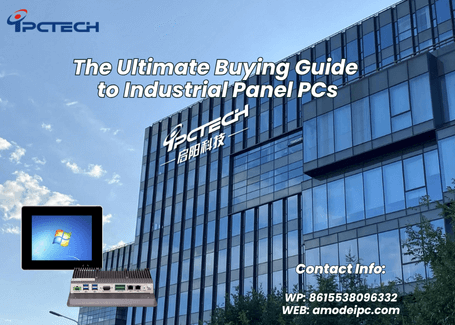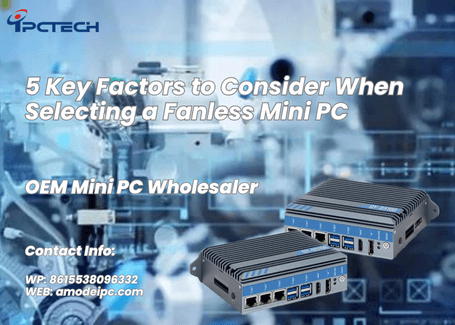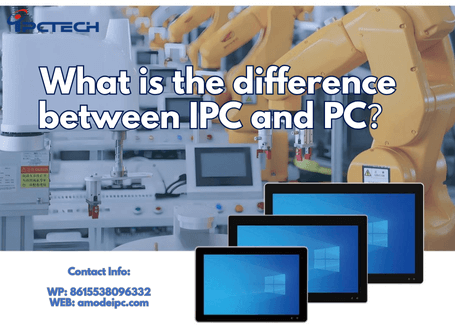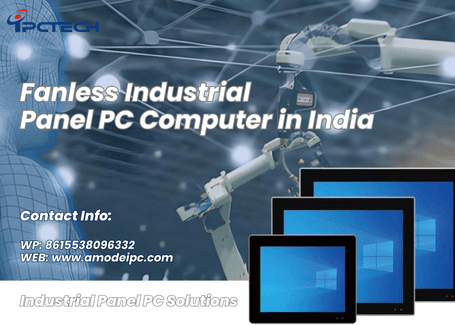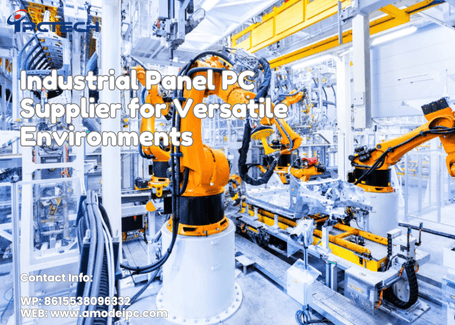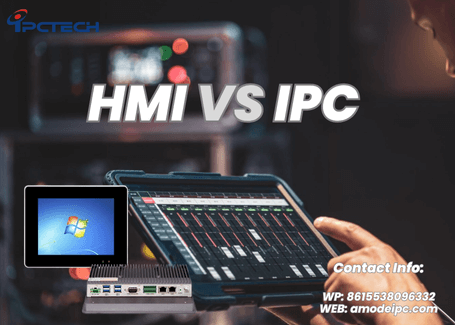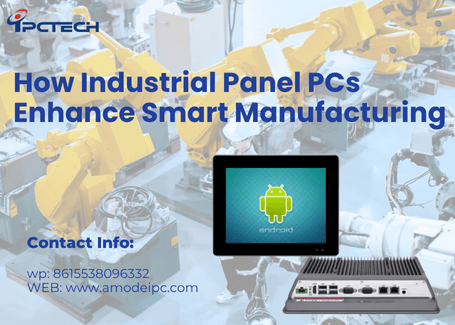Industrial panel pcs in Industrial Manufacturing
2025-06-27
In the field of industrial manufacturing, the wave of technological innovation has never stopped. From the traditional mechanical manufacturing to today's highly automated, intelligent production model, each leap is inseparable from the key technology and equipment support. Industrial computers are now being deeply integrated into the production process in an unprecedented manner, pushing the whole industry to move forward in the direction of more efficient, more accurate and more intelligent. It is not only the cornerstone of production automation, but also the core driving force for realizing intelligent manufacturing in the era of Industry 4.0.
Industrial computers, in essence, are computer systems designed and manufactured specifically for industrial environments. Compared with the ordinary computers we use every day, industrial computers do not simply pursue extreme computing speed and rich multimedia functions, but focus on meeting the special needs of industrial production.
Ordinary computers are usually used in relatively mild environments such as office and entertainment, with more relaxed requirements for operating conditions. Their design focuses on the user experience, such as thin and lightweight portable, strong graphics processing ability. While industrial computers face complex and changing industrial scenarios, such as high temperature, low temperature, high humidity, strong vibration, dusty, electromagnetic interference serious workshop, as well as automated production lines with high requirements for real-time and stability of data processing. Therefore, industrial computers have a unique design in terms of hardware architecture, system stability, and data processing capability.
Usually in hardware, industrial computers are designed with wide-temperature CPUs, high-protection chassis, and shock-resistant storage devices, etc. At the software level, they are often equipped with customized industrial operating systems to ensure that they can run stably under extreme conditions and efficiently process all kinds of data and commands in industrial production.
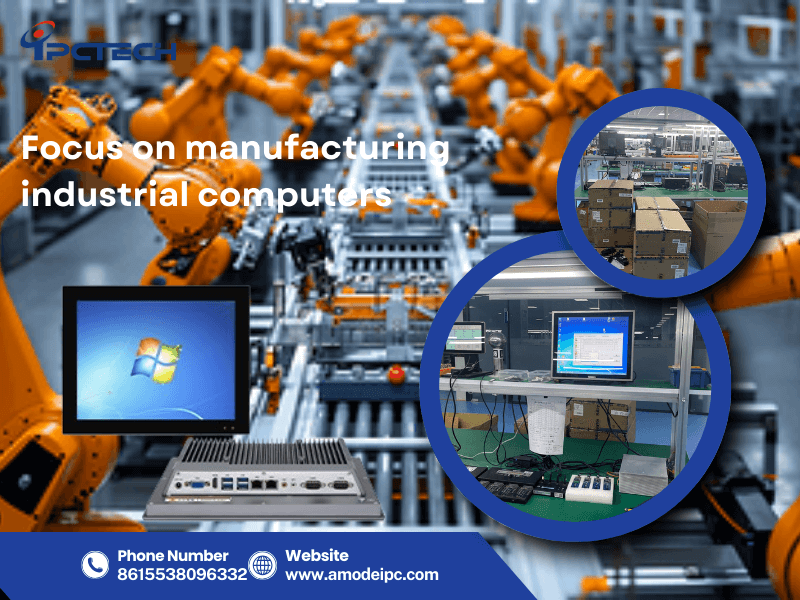
Industrial production often requires long hours of continuous operation, and once a computer system fails, it can cause the entire production line to come to a standstill, resulting in huge economic losses. Industrial computers are designed to improve durability through the use of high-quality electronic components and rigorous manufacturing processes. The motherboards of industrial computers are usually made of industrial-grade PCBs, which provide better electrical performance and aging resistance; key components undergo rigorous aging tests and quality screening to ensure that they remain stable even after long periods of operation.
In the industrial production plant, the operation of mechanical equipment will produce continuous vibration, flying dust, oil and other pollutants are also everywhere. Industrial computers have been designed for this purpose, such as the use of fanless design to avoid vibration due to fan rotation, while preventing dust from entering the interior of the chassis; hard disk and other storage devices using anti-vibration reinforcement technology, even in a strong vibration environment, but also to ensure that the data can be safely read and written; chassis sealing and dust-proof design, IP65 or even higher levels of protection, effectively resisting the intrusion of dust and liquid.
Different industrial production scenarios have extremely different requirements for environmental temperature and humidity. From a high-temperature steelmaking workshop to a low-temperature cold-chain logistics warehouse, industrial computers need to work properly. Industrial computers have the ability to operate in a wide range of temperatures, can operate stably in the extreme temperature range of - 40 ℃ to 70 ℃; in terms of humidity, it can also adapt to high humidity and even condensation environment, through special moisture-proof treatment and circuit design, to avoid short circuit and other malfunctions caused by humidity problems.
Embedded computer with its highly integrated and miniaturized features is widely used in industrial automation control, intelligent equipment and other fields. It embeds computer core function modules into various devices or systems to realize specific control and data processing functions. For example, in CNC machine tools, embedded computers are responsible for receiving and processing control commands, and accurately controlling the movement trajectory of the machine tool; in smart meters, they are used to measure power, collect data and realize remote communication. Embedded computers usually have low power consumption and small space requirements, and can adapt to complex industrial environments to meet the intelligentization and automation needs of equipment.
Rack-mounted computers use standard rack-mounting structure, which is convenient for centralized management and deployment in data centers, industrial control cabinets and so on. These computers are powerful and scalable, and can be flexibly configured with processors, memory, storage and other hardware resources according to actual needs. In industrial manufacturing, rack-mounted computers are commonly used in data center servers, central control systems for large automated production lines. For example, the production line control center of automobile manufacturing enterprises, through multiple rack-mounted computers work together to achieve real-time monitoring of the entire production line, data processing and scheduling management, to ensure the efficient and orderly operation of the production process.
The industrial tablet PC integrates computer, monitor and touch screen, which is easy to operate and has strong human-computer interaction. It has industrial-grade protection performance, can be used in harsh environments, widely used in field operations, equipment monitoring, data collection and other scenarios. For example, in the chemical production workshop, operators can view the production data and adjust the equipment parameters in real time through the industrial tablet PC; in the logistics and warehousing links, the staff use the industrial tablet PC to scan the barcode of the goods to realize the inventory management and goods tracking. In addition, industrial tablet PC also supports wireless communication function, which is convenient for data interaction and remote control with other equipment.
Industrial computer is the core of industrial automation control system. In modern industrial production, from simple single-machine automation equipment to complex large-scale production lines, are inseparable from the control of industrial computers. For example, in the food and beverage production line, industrial computers through preset programs and algorithms, precise control of filling, packaging and other aspects of the speed, dose and quality; in the power system, industrial computers real-time monitoring of the grid operating status, automatic adjustment of power generation, transmission and distribution equipment parameters, to ensure the stability and safety of power supply. Through the collaborative work of industrial computers and various types of sensors and actuators, it realizes the automatic control of the production process, improves the production efficiency and product quality, and reduces the labor cost and labor intensity.
The industrial manufacturing process generates huge amounts of data, such as equipment operating parameters, production progress, product quality inspection data and so on. Industrial computers can efficiently collect these data and process and mine them through data analysis software. For example, in the machining industry, industrial computers collect machine tool speed, feed, tool wear and other data, and through big data analysis and machine learning algorithms, predict the likelihood of equipment failure, arrange maintenance in advance, and reduce downtime; in the automotive manufacturing enterprises, the use of industrial computers to analyze the quality inspection data in the production process, find out the key factors that affect product quality, optimize the In automobile manufacturing enterprises, industrial computers are used to analyze the quality inspection data in the production process, find out the key factors affecting product quality, optimize the production process and improve the product qualification rate. Data collection and analysis allows industrial production to shift from experience-driven to data-driven, realizing refined management and decision-making.
Machine vision technology is another important application area for industrial computers in industrial manufacturing. Industrial computers are combined with cameras, image sensors and other equipment to form a machine vision system, which is capable of fast and accurate detection and identification of products. For example, in the electronics manufacturing industry, machine vision systems can detect the welding quality and dimensional accuracy of components on circuit boards; in the food packaging industry, it is used to detect the integrity of the package and whether the label is correctly affixed. Machine vision system not only detects fast and accurate, but also avoids the subjectivity and fatigue problem of manual inspection, improves the efficiency and accuracy of product quality inspection, and at the same time reduces the production cost of enterprises.
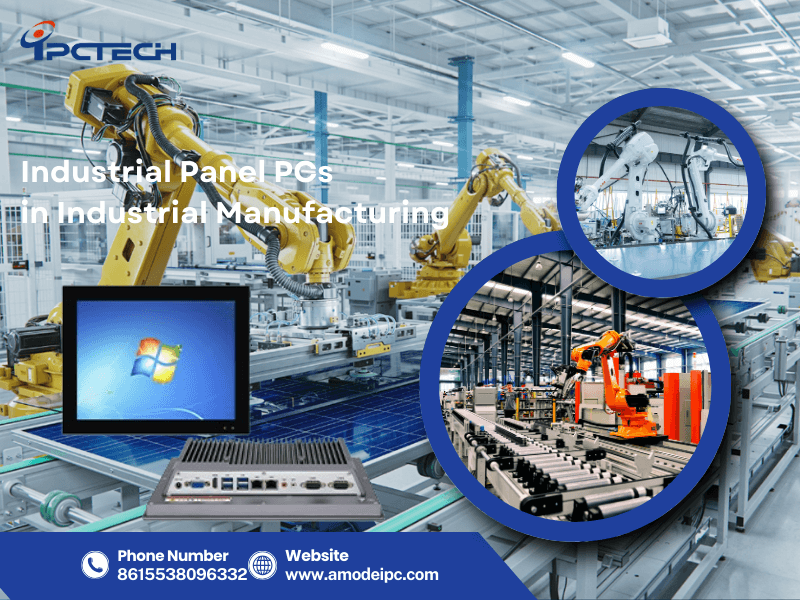
When choosing the right industrial computer, first of all, we should clarify our own application requirements, including performance requirements, use of the environment, functional requirements. Then according to these needs, comprehensive consideration of industrial computer performance, environmental adaptability, scalability, cost-effective and other factors.
IPCTECH is a high-tech enterprise focusing on the research, development, production and service of industrial touch panel PCs, industrial LCD monitors, industrial fanless mini PCs, ARM industrial all-in-one PCs, explosion-proof computers and military ruggedized notebooks. Products are widely used in military, telecommunications, metallurgy, transportation, electric power, railroads, aviation, communications, finance, networks, medical, machinery manufacturing, precision instruments and other fields, for a variety of customers, to provide industrial computer solutions.
Determine the required computing performance based on the actual application scenario. For example, for data acquisition and simple control tasks, industrial computers with lower configurations can satisfy; for complex data analysis, machine vision processing and other tasks, high-performance processors, high-capacity memory and high-speed storage devices are required.
Fully consider the use of industrial computers in the environment, including temperature, humidity, vibration, dust and other factors. Select equipment with the appropriate level of protection and environmental adaptability to ensure its stable operation in harsh environments.
Consider future business development and function expansion needs, and choose industrial computers with good expandability. For example, with multiple PCI/PCIe slots, USB interfaces, network ports, etc., it is convenient to add a variety of functional modules and external devices.
Under the premise of meeting the performance and functional requirements, comprehensively consider the procurement cost, maintenance cost and service life and other factors, select cost-effective industrial computer products.
Hardware Inspection: Regularly check whether the hardware connections are loose, such as hard disk, memory, graphics card, etc.; conduct performance tests on key components, such as the health status of hard disk, power supply output voltage, etc., to detect and replace faulty components in time.
The core of the Industry 4.0 era is to realize intelligent manufacturing, connecting all aspects of industrial production through the Internet of Things, big data, artificial intelligence and other technologies to realize the intelligence, automation and digitalization of the production process. The industrial computer plays a crucial role in Industry 4.0. It is the key hub for connecting equipment, collecting data, processing information and giving instructions, promoting the transformation of industrial production from the traditional linear mode to the networked and intelligent mode. For example, in an Industry 4.0 factory, the industrial computer connects various types of equipment into an organic whole through IoT technology, realizing information sharing and collaborative work between equipment; using big data analysis and artificial intelligence algorithms, it carries out in-depth mining of production data and intelligent decision-making, optimizes the production process, and improves production efficiency and product quality.
The rapid development of artificial intelligence and big data technology has brought new opportunities and challenges for industrial computers. On the one hand, the application of artificial intelligence technology makes industrial computers have more powerful intelligent decision-making capabilities. For example, through machine learning algorithms, industrial computers can make more accurate predictions and diagnoses of equipment failures and realize preventive maintenance; using deep learning technology, they can improve the recognition accuracy and efficiency of the machine vision system and realize more complex product detection and quality control. On the other hand, the development of big data technology requires industrial computers to have more efficient data processing and storage capabilities. The massive amount of data generated in the industrial manufacturing process requires industrial computers to quickly collect, store and analyze to obtain valuable information to provide support for enterprise decision-making. In the future, industrial computers will be deeply integrated with artificial intelligence, big data and other technologies to continuously improve the intelligent level of industrial manufacturing.
As the core technical equipment of industrial manufacturing, industrial computers play an irreplaceable role in all aspects of industrial production with their unique design, powerful functions and ability to adapt to harsh environments. From automation control to data acquisition and analysis, from machine vision detection to the realization of intelligent manufacturing, industrial computers run through the entire process of industrial manufacturing, driving the continuous development and progress of the industry.
Looking ahead, with the in-depth promotion of the Industry 4.0 strategy and the continuous innovation of artificial intelligence, big data, Internet of Things and other emerging technologies, the industrial computer will usher in a broader space for development. It will be constantly upgraded and improved to meet the growing demand for intelligence in industrial manufacturing with higher performance, stronger intelligence and better adaptability, leading industrial manufacturing towards a new era of more efficient, intelligent and green.
IPCTECH provides industrial computer solutions for customers in many fields, from pre-demand customization to after-sales technical support, and always guarantee the full-cycle experience of customers with our professional team. We sincerely invite customers from all over the world to visit our factory, explore the innovation possibilities of industrial automation and intelligent equipment, and work together to build more competitive industrial solutions.
Industrial Computers Solutions for Industrial Operations
Industrial computers, in essence, are computer systems designed and manufactured specifically for industrial environments. Compared with the ordinary computers we use every day, industrial computers do not simply pursue extreme computing speed and rich multimedia functions, but focus on meeting the special needs of industrial production.
Ordinary computers are usually used in relatively mild environments such as office and entertainment, with more relaxed requirements for operating conditions. Their design focuses on the user experience, such as thin and lightweight portable, strong graphics processing ability. While industrial computers face complex and changing industrial scenarios, such as high temperature, low temperature, high humidity, strong vibration, dusty, electromagnetic interference serious workshop, as well as automated production lines with high requirements for real-time and stability of data processing. Therefore, industrial computers have a unique design in terms of hardware architecture, system stability, and data processing capability.
Usually in hardware, industrial computers are designed with wide-temperature CPUs, high-protection chassis, and shock-resistant storage devices, etc. At the software level, they are often equipped with customized industrial operating systems to ensure that they can run stably under extreme conditions and efficiently process all kinds of data and commands in industrial production.
Main Features of Industrial Panel PCs

Durability and Reliability
Industrial production often requires long hours of continuous operation, and once a computer system fails, it can cause the entire production line to come to a standstill, resulting in huge economic losses. Industrial computers are designed to improve durability through the use of high-quality electronic components and rigorous manufacturing processes. The motherboards of industrial computers are usually made of industrial-grade PCBs, which provide better electrical performance and aging resistance; key components undergo rigorous aging tests and quality screening to ensure that they remain stable even after long periods of operation.
Vibration and Contamination Resistance
In the industrial production plant, the operation of mechanical equipment will produce continuous vibration, flying dust, oil and other pollutants are also everywhere. Industrial computers have been designed for this purpose, such as the use of fanless design to avoid vibration due to fan rotation, while preventing dust from entering the interior of the chassis; hard disk and other storage devices using anti-vibration reinforcement technology, even in a strong vibration environment, but also to ensure that the data can be safely read and written; chassis sealing and dust-proof design, IP65 or even higher levels of protection, effectively resisting the intrusion of dust and liquid.
Temperature and Humidity Adaptability
Different industrial production scenarios have extremely different requirements for environmental temperature and humidity. From a high-temperature steelmaking workshop to a low-temperature cold-chain logistics warehouse, industrial computers need to work properly. Industrial computers have the ability to operate in a wide range of temperatures, can operate stably in the extreme temperature range of - 40 ℃ to 70 ℃; in terms of humidity, it can also adapt to high humidity and even condensation environment, through special moisture-proof treatment and circuit design, to avoid short circuit and other malfunctions caused by humidity problems.
Types of Industrial Computers
Embedded Computers
Embedded computer with its highly integrated and miniaturized features is widely used in industrial automation control, intelligent equipment and other fields. It embeds computer core function modules into various devices or systems to realize specific control and data processing functions. For example, in CNC machine tools, embedded computers are responsible for receiving and processing control commands, and accurately controlling the movement trajectory of the machine tool; in smart meters, they are used to measure power, collect data and realize remote communication. Embedded computers usually have low power consumption and small space requirements, and can adapt to complex industrial environments to meet the intelligentization and automation needs of equipment.
Rack-mounted Computers
Rack-mounted computers use standard rack-mounting structure, which is convenient for centralized management and deployment in data centers, industrial control cabinets and so on. These computers are powerful and scalable, and can be flexibly configured with processors, memory, storage and other hardware resources according to actual needs. In industrial manufacturing, rack-mounted computers are commonly used in data center servers, central control systems for large automated production lines. For example, the production line control center of automobile manufacturing enterprises, through multiple rack-mounted computers work together to achieve real-time monitoring of the entire production line, data processing and scheduling management, to ensure the efficient and orderly operation of the production process.
Industrial Tablet PCs
The industrial tablet PC integrates computer, monitor and touch screen, which is easy to operate and has strong human-computer interaction. It has industrial-grade protection performance, can be used in harsh environments, widely used in field operations, equipment monitoring, data collection and other scenarios. For example, in the chemical production workshop, operators can view the production data and adjust the equipment parameters in real time through the industrial tablet PC; in the logistics and warehousing links, the staff use the industrial tablet PC to scan the barcode of the goods to realize the inventory management and goods tracking. In addition, industrial tablet PC also supports wireless communication function, which is convenient for data interaction and remote control with other equipment.
Applications of Industrial PCs in Manufacturing
Automation and Control Systems
Industrial computer is the core of industrial automation control system. In modern industrial production, from simple single-machine automation equipment to complex large-scale production lines, are inseparable from the control of industrial computers. For example, in the food and beverage production line, industrial computers through preset programs and algorithms, precise control of filling, packaging and other aspects of the speed, dose and quality; in the power system, industrial computers real-time monitoring of the grid operating status, automatic adjustment of power generation, transmission and distribution equipment parameters, to ensure the stability and safety of power supply. Through the collaborative work of industrial computers and various types of sensors and actuators, it realizes the automatic control of the production process, improves the production efficiency and product quality, and reduces the labor cost and labor intensity.
Data Acquisition and Analysis
The industrial manufacturing process generates huge amounts of data, such as equipment operating parameters, production progress, product quality inspection data and so on. Industrial computers can efficiently collect these data and process and mine them through data analysis software. For example, in the machining industry, industrial computers collect machine tool speed, feed, tool wear and other data, and through big data analysis and machine learning algorithms, predict the likelihood of equipment failure, arrange maintenance in advance, and reduce downtime; in the automotive manufacturing enterprises, the use of industrial computers to analyze the quality inspection data in the production process, find out the key factors that affect product quality, optimize the In automobile manufacturing enterprises, industrial computers are used to analyze the quality inspection data in the production process, find out the key factors affecting product quality, optimize the production process and improve the product qualification rate. Data collection and analysis allows industrial production to shift from experience-driven to data-driven, realizing refined management and decision-making.
Machine Vision and Inspection
Machine vision technology is another important application area for industrial computers in industrial manufacturing. Industrial computers are combined with cameras, image sensors and other equipment to form a machine vision system, which is capable of fast and accurate detection and identification of products. For example, in the electronics manufacturing industry, machine vision systems can detect the welding quality and dimensional accuracy of components on circuit boards; in the food packaging industry, it is used to detect the integrity of the package and whether the label is correctly affixed. Machine vision system not only detects fast and accurate, but also avoids the subjectivity and fatigue problem of manual inspection, improves the efficiency and accuracy of product quality inspection, and at the same time reduces the production cost of enterprises.
How to Choose the Right Industrial Panel PCs ?

When choosing the right industrial computer, first of all, we should clarify our own application requirements, including performance requirements, use of the environment, functional requirements. Then according to these needs, comprehensive consideration of industrial computer performance, environmental adaptability, scalability, cost-effective and other factors.
IPCTECH is a high-tech enterprise focusing on the research, development, production and service of industrial touch panel PCs, industrial LCD monitors, industrial fanless mini PCs, ARM industrial all-in-one PCs, explosion-proof computers and military ruggedized notebooks. Products are widely used in military, telecommunications, metallurgy, transportation, electric power, railroads, aviation, communications, finance, networks, medical, machinery manufacturing, precision instruments and other fields, for a variety of customers, to provide industrial computer solutions.
Factors to Consider When Selecting Industrial Computers
Performance
Determine the required computing performance based on the actual application scenario. For example, for data acquisition and simple control tasks, industrial computers with lower configurations can satisfy; for complex data analysis, machine vision processing and other tasks, high-performance processors, high-capacity memory and high-speed storage devices are required.
Environmental Adaptability
Fully consider the use of industrial computers in the environment, including temperature, humidity, vibration, dust and other factors. Select equipment with the appropriate level of protection and environmental adaptability to ensure its stable operation in harsh environments.
Expandability
Consider future business development and function expansion needs, and choose industrial computers with good expandability. For example, with multiple PCI/PCIe slots, USB interfaces, network ports, etc., it is convenient to add a variety of functional modules and external devices.
Cost
Under the premise of meeting the performance and functional requirements, comprehensively consider the procurement cost, maintenance cost and service life and other factors, select cost-effective industrial computer products.
Maintenance of Industrial Touchscreen PC
Regular cleaning:
Regularly clean the chassis, fans and other components of industrial computers to prevent dust accumulation from affecting heat dissipation and equipment performance. Cleaning should use anti-static tools, and ensure that the equipment is powered off.Software maintenance:
update the operating system and application software patches in a timely manner to prevent security loopholes; regularly check the system for viruses and disk cleanup to optimize system performance.Hardware Inspection: Regularly check whether the hardware connections are loose, such as hard disk, memory, graphics card, etc.; conduct performance tests on key components, such as the health status of hard disk, power supply output voltage, etc., to detect and replace faulty components in time.
Future Trends
The core of the Industry 4.0 era is to realize intelligent manufacturing, connecting all aspects of industrial production through the Internet of Things, big data, artificial intelligence and other technologies to realize the intelligence, automation and digitalization of the production process. The industrial computer plays a crucial role in Industry 4.0. It is the key hub for connecting equipment, collecting data, processing information and giving instructions, promoting the transformation of industrial production from the traditional linear mode to the networked and intelligent mode. For example, in an Industry 4.0 factory, the industrial computer connects various types of equipment into an organic whole through IoT technology, realizing information sharing and collaborative work between equipment; using big data analysis and artificial intelligence algorithms, it carries out in-depth mining of production data and intelligent decision-making, optimizes the production process, and improves production efficiency and product quality.
Impact of Artificial Intelligence and Big Data
The rapid development of artificial intelligence and big data technology has brought new opportunities and challenges for industrial computers. On the one hand, the application of artificial intelligence technology makes industrial computers have more powerful intelligent decision-making capabilities. For example, through machine learning algorithms, industrial computers can make more accurate predictions and diagnoses of equipment failures and realize preventive maintenance; using deep learning technology, they can improve the recognition accuracy and efficiency of the machine vision system and realize more complex product detection and quality control. On the other hand, the development of big data technology requires industrial computers to have more efficient data processing and storage capabilities. The massive amount of data generated in the industrial manufacturing process requires industrial computers to quickly collect, store and analyze to obtain valuable information to provide support for enterprise decision-making. In the future, industrial computers will be deeply integrated with artificial intelligence, big data and other technologies to continuously improve the intelligent level of industrial manufacturing.
Conclusion
As the core technical equipment of industrial manufacturing, industrial computers play an irreplaceable role in all aspects of industrial production with their unique design, powerful functions and ability to adapt to harsh environments. From automation control to data acquisition and analysis, from machine vision detection to the realization of intelligent manufacturing, industrial computers run through the entire process of industrial manufacturing, driving the continuous development and progress of the industry.
Looking ahead, with the in-depth promotion of the Industry 4.0 strategy and the continuous innovation of artificial intelligence, big data, Internet of Things and other emerging technologies, the industrial computer will usher in a broader space for development. It will be constantly upgraded and improved to meet the growing demand for intelligence in industrial manufacturing with higher performance, stronger intelligence and better adaptability, leading industrial manufacturing towards a new era of more efficient, intelligent and green.
IPCTECH provides industrial computer solutions for customers in many fields, from pre-demand customization to after-sales technical support, and always guarantee the full-cycle experience of customers with our professional team. We sincerely invite customers from all over the world to visit our factory, explore the innovation possibilities of industrial automation and intelligent equipment, and work together to build more competitive industrial solutions.
Recommended
